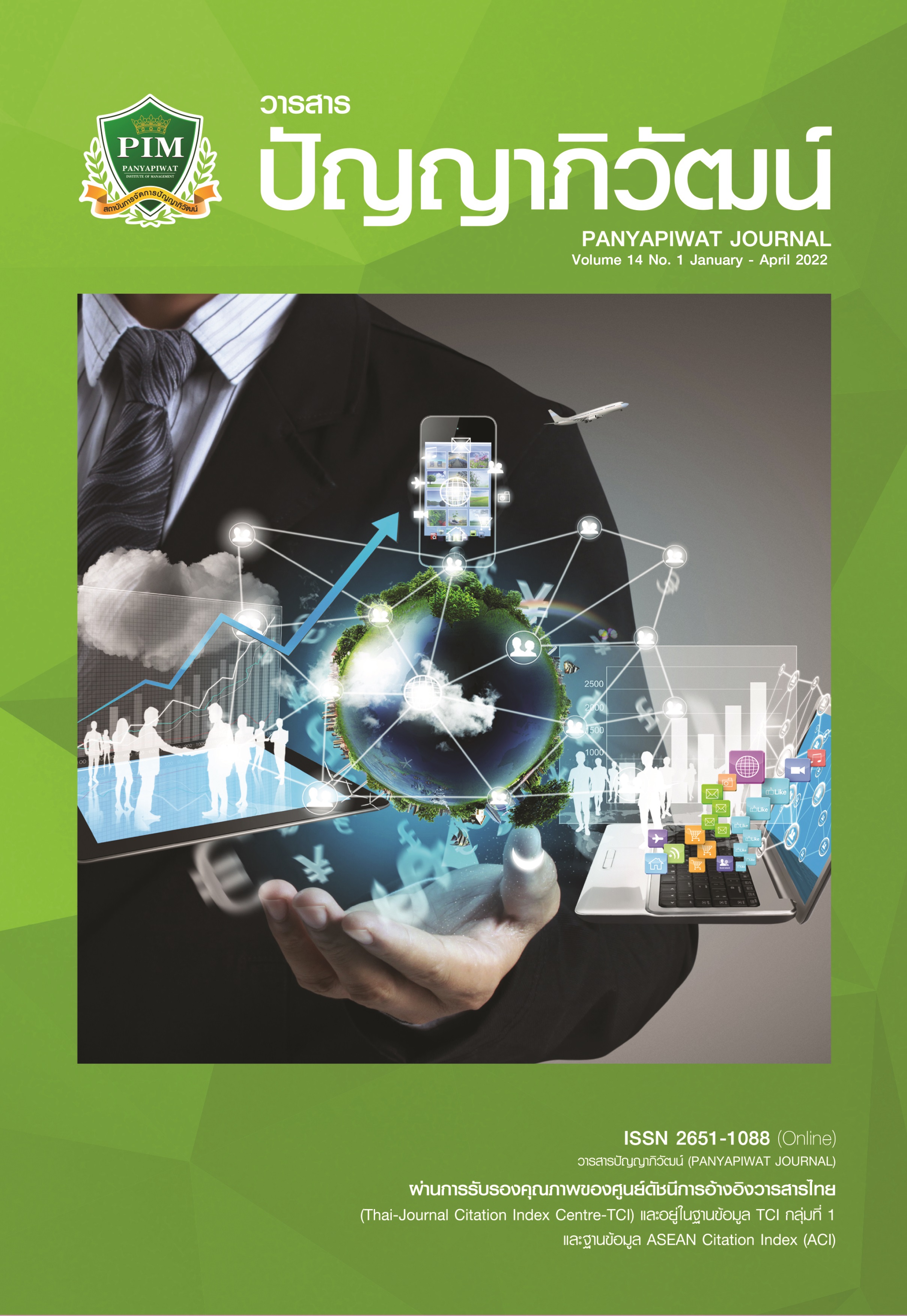การมุ่งเน้นความเป็นผู้ประกอบการและการมุ่งเน้นการเรียนรู้ที่ส่งผลต่อความสามารถ ทางนวัตกรรมกับความได้เปรียบทางการแข่งขันของบริษัทจดทะเบียน ในตลาดหลักทรัพย์แห่งประเทศไทย
Main Article Content
บทคัดย่อ
การวิจัยครั้งนี้มีวัตถุประสงค์เพื่อศึกษาอิทธิพลของการมุ่งเน้นความเป็นผู้ประกอบการและการมุ่งเน้นการเรียนรู้ที่ส่งผลต่อความสามารถทางนวัตกรรมกับความได้เปรียบทางการแข่งขันของบริษัทจดทะเบียนในตลาดหลักทรัพย์แห่งประเทศไทย โดยใช้แบบสอบถามเป็นเครื่องมือในการเก็บรวบรวมข้อมูลจากผู้บริหารของบริษัทที่มีรายชื่อในฐานข้อมูลของตลาดหลักทรัพย์แห่งประเทศไทย จำนวน 273 คน การวิเคราะห์ข้อมูลใช้แบบจำลองสมการโครงสร้าง (SEM) มาพัฒนาแบบจำลอง พร้อมทั้งตรวจสอบความสอดคล้องระหว่างแบบจำลองกับข้อมูลเชิงประจักษ์และศึกษาอิทธิพลที่เกิดขึ้นระหว่างปัจจัย ผลการศึกษาพบว่า แบบจำลองกับข้อมูลเชิงประจักษ์มีความสอดคล้องกันตามเงื่อนไข (Chi-square = 82.11, df = 63, Chi-square/df = 1.30, p = 0.72, RMSEA = 0.00, GFI = 0.97, AGFI = 0.98) และพบว่า ปัจจัยการมุ่งเน้นความเป็นผู้ประกอบการและการมุ่งเน้นการเรียนรู้ของผู้บริหารมีอิทธิพลทางตรงต่อความสามารถทางนวัตกรรมขององค์กร และยังมีอิทธิพลทางตรงและทางอ้อมต่อความได้เปรียบทางการแข่งขันอย่างมีนัยสำคัญทางสถิติ ณ ระดับ 0.05 ข้อค้นพบแสดงให้เห็นว่าการให้ความสำคัญในเรื่องของการมุ่งเน้นความเป็นผู้ประกอบการของผู้บริหารและการมุ่งเน้นการเรียนรู้ของผู้บริหารจะนำไปสู่ความสามารถทางนวัตกรรมขององค์กรและความได้เปรียบทางการแข่งขันที่เพิ่มขึ้น
Article Details

อนุญาตภายใต้เงื่อนไข Creative Commons Attribution-NonCommercial-NoDerivatives 4.0 International License.
“ข้าพเจ้าและผู้เขียนร่วม (ถ้ามี) ขอรับรองว่า บทความที่เสนอมานี้ยังไม่เคยได้รับการตีพิมพ์และไม่ได้อยู่ระหว่างกระบวนการพิจารณาลงตีพิมพ์ในวารสารหรือแหล่งเผยแพร่อื่นใด ข้าพเจ้าและผู้เขียนร่วมยอมรับหลักเกณฑ์การพิจารณาต้นฉบับ ทั้งยินยอมให้กองบรรณาธิการมีสิทธิ์พิจารณาและตรวจแก้ต้นฉบับได้ตามที่เห็นสมควร พร้อมนี้ขอมอบลิขสิทธิ์บทความที่ได้รับการตีพิมพ์ให้แก่สถาบันการจัดการปัญญาภิวัฒน์หากมีการฟ้องร้องเรื่องการละเมิดลิขสิทธิ์เกี่ยวกับภาพ กราฟ ข้อความส่วนใดส่วนหนึ่งและ/หรือข้อคิดเห็นที่ปรากฏในบทความข้าพเจ้าและผู้เขียนร่วมยินยอมรับผิดชอบแต่เพียงฝ่ายเดียว”
เอกสารอ้างอิง
Alegre, J., & Chiva, R. (2013). Linking entrepreneurial orientation and firm performance: The role of organizational learning capability and innovation performance. Journal of Small Business Management, 51(4), 491-507.
Barney, J. B. (1991). The resource-based view of strategy: Origins, implications, and prospects. Journal of Management, 17, 97-221.
Byrne, D. S. (1998). Complexity theory and the social sciences: An introduction. Routledge Psychology Press.
Barney, J. B., Ketchen, D. J. Jr., & Wright, M. (2011). The future of resource-based theory: Revitalization or decline? Journal of Management, 37(5), 1299-1315.
Beneke, J., Blampied, S., Dewar, N., & Soriano, L. (2016). The impact of market orientation and learning orientation on organisational performance. Journal of Research in Marketing and Entrepreneurship, 18(1), 90-108.
Calantone, R. J., Harmancioglu, N., & Droge, C. (2010). Inconclusive innovation “returns”: A metaanalysis of research on innovation in new product development. Journal of Product Innovation Management, 27(7), 1065-1081.
Cronbach, L. J., & Furby, L. (1970). How we should measure “change”: Or should we? Psychological Bulletin, 74(1), 68-80.
Doulani, A., Sahebi, S., & Saberi, M. K. (2020). Assessing the entrepreneurial orientation of the librarians. Global Knowledge, Memory and Communication, 69(4/5), 253-268.
Ferreira, J., & Coelho, A. (2020). Dynamic capabilities, innovation and branding capabilities and their impact on competitive advantage and SME’s performance in Portugal: The moderating effects of entrepreneurial orientation. International Journal of Innovation
Science, 12(3), 255-286.
Gunday, G., Ulusoy, G., Kilic, K., & Alpkan, L. (2011). Effects of innovation types on firm performance. International Journal of Production Economics, 133(2), 662-676.
Gupta, A., Chen, J., & Gupta, V. K. (2016). Does management’s attention to different facets of entrepreneurial orientation create value for the firm? A longitudinal study of large retailer. New England Journal of Entrepreneurship, 19(2), 54-71.
Hair, J. F., Black, W. C., Babin, B. J., & Anderson, R. E. (2010). Multivariate data analysis (7th ed.). Pearson Education.
Hana, U. (2013). Competitive advantage achievement through innovation and knowledge. Journal of Competitiveness, 5(1), 82-96.
Healy, P., Serafeim, G., Srinivasan, S., & Yu, G. (2014). Market competition, earnings management and persistence in accounting profitability around the world. Review of Accounting Studies, 19(4), 1281-1308.
Huang, S. K., & Wang, Y. L. (2011). Entrepreneurial orientation, learning orientation and innovation in small and medium enterprises. Procedia-Social and Behavioral Sciences, 24, 563-570.
Hult, G. T. M., Hurley, R. F., & Knight, G. A. (2004). Innovativeness: Its antecedents and impact on business performance. Industrial Marketing Management, 33(5), 429-438.
Jackson, S. (2001). Successfully implementing total quality management tools within healthcare: What are the key actions? International Journal of Health Care Quality Assurance, 14(4), 157-163.
Likert, R. (1961). New patterns of management. McGraw-Hill.
Myrden, S. E., & Kelloway, K. (2015). Young workers’ perception of brand image: Main and moderating effects. Journal of Organizational Effectiveness: People and Performance, 2(3), 267-281.
Nunnally, J. C., & Bernstein, I. H. (1994). Psychometric theory (3rd ed.). McGraw-Hill.
Pallant, J. (2020). SPSS survival manual: A step by step guide to data analysis using IBM SPSS. Routledge.
Pratono, A. H., Darmasetiawan, N. K., Yudiarso, A., & Jeong, B. G. (2019). Achieving sustainable competitive advantage through green entrepreneurial orientation and market orientation. The Bottom Line, 11, 1-19.
Rangus, K., & Slavec, A. (2017). The interplay of decentralization, employee involvement and absorptive capacity on firms’ innovation and business performance. Technological Forecasting and Social Change, 120, 195-203.
Rhee, J., Park, T., & Lee, D. H. (2010). Drivers of innovativeness and performance for innovative SMEs in South Korea: Mediation of learn in orientation. Technovation, 30(1), 65-75.
Shaukat, S., Nawaz, M. S., & Naz, S. (2013). Effects of innovation types on firm performance: An empirical study on Pakistan’s manufacturing sector. Pakistan Journal of Commerce and Social Sciences, 7(2), 243-262.
Tho, N. D. (2019). Strategic orientations and firm innovativeness: A necessary condition analysis. Baltic Journal of Management, 14(3), 427-442.
Wutthirong, P. (2015). Innovation management: Resource, learning organization and innovation. Chulalongkorn University Press. [in Thai]


